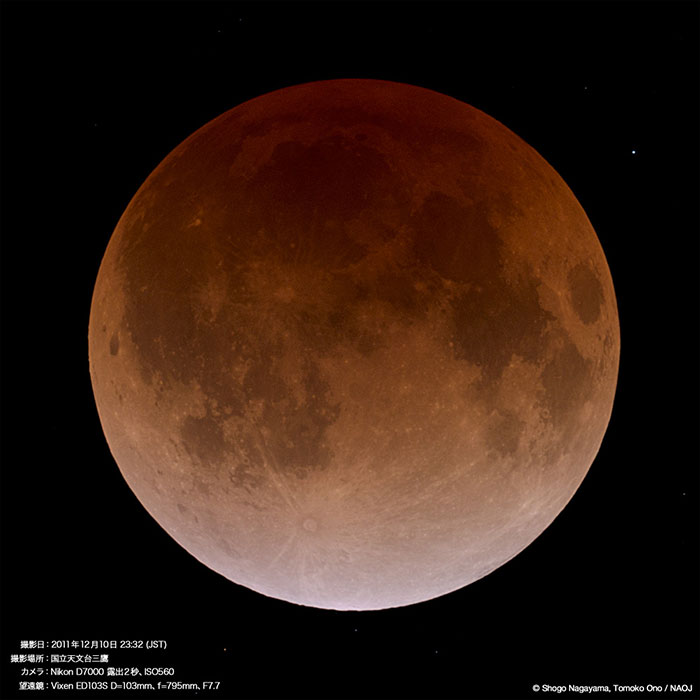Total Lunar Eclipse - December 10, 2011
Astrophotography・

| Date | 11:32 pm December 10, 2011 (Japan Standard Time) |
|---|---|
| Location | NAOJ Mitaka Campus |
| Photographer | Shogo Nagayama, Tomoko Ono |
| Copyright | National Astronomical Observatory of Japan |
Astrophotography・

| Date | 11:32 pm December 10, 2011 (Japan Standard Time) |
|---|---|
| Location | NAOJ Mitaka Campus |
| Photographer | Shogo Nagayama, Tomoko Ono |
| Copyright | National Astronomical Observatory of Japan |
The bright winter full moon which had lit up the scene had been eaten away little by little while losing its brightness to become a total lunar eclipse. About the time it crossed the meridian, as if dissolving into the night sky, the Moon changed into a gloomy ball of dim light. The fully eclipsed Moon floated and drifted in the pitch-black winter night sky. While that eerie bronze form captivated the eye, the stars which had meanwhile regained their luster beautifully adorned the winter night sky as if the Moon hadn’t been there.
The Pleasure of a Total Lunar Eclipse
The total lunar eclipse of December 10, 2011, was an event with the right conditions to be visible throughout all of Japan from the start of the partial eclipse to the finish. Additionally, from Tokyo where this picture was taken, the time of greatest eclipse coincide with the time the Moon crossed the meridian. Good conditions with clear weather throughout the night meant you could enjoy the bronze moon climbing high in the winter night sky to your heart’s content.
During a total lunar eclipse, pay attention to not just the changes in the color, brightness and their respective gradients as the Moon is disappearing, during totality, and as it returns to a full moon; also look at the night sky recovered in the darkness of the total eclipse. We suggest you turn your eyes to the brightly shining stars in that sky. For a couple of hours on the night of the full moon, decorative stars and the bronze, eclipsed Moon collaborate together to make a beautiful scene.
The Total Lunar Eclipse of October 8, 2014
On October 8 of this year, all of Japan except for a small part will be able to observe the total duration of a partial or total lunar eclipse. This time, the partial eclipse will start at 6:15 pm, when the Moon has just risen in the eastern sky. A total lunar eclipse will be visible for about an hour starting from around 7:25 pm. Since this is a convenient time to observe the event, by all means, let’s enjoy this lunar eclipse.
Author: Tomoko Ono (NAOJ Public Relations Center)